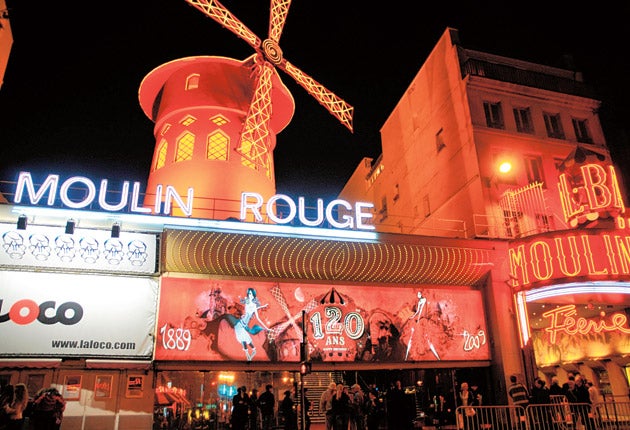Wanted: ideas for how to kick-start Paris nightlife
Conference looks at ways to resurrect 'fun capital of the world'

Your support helps us to tell the story
From reproductive rights to climate change to Big Tech, The Independent is on the ground when the story is developing. Whether it's investigating the financials of Elon Musk's pro-Trump PAC or producing our latest documentary, 'The A Word', which shines a light on the American women fighting for reproductive rights, we know how important it is to parse out the facts from the messaging.
At such a critical moment in US history, we need reporters on the ground. Your donation allows us to keep sending journalists to speak to both sides of the story.
The Independent is trusted by Americans across the entire political spectrum. And unlike many other quality news outlets, we choose not to lock Americans out of our reporting and analysis with paywalls. We believe quality journalism should be available to everyone, paid for by those who can afford it.
Your support makes all the difference.Paris, city of light and city of lovers, is in danger of becoming the city of lights-out and the city of sleepers.
A two-day official conference, ending today, will suggest ways of waking up an increasingly somnolent city once regarded as the fun capital of the world.
The "parliament of the night", sponsored by the Paris town hall, is considering, among other things, later hours for public transport, subsidies for the soundproofing of clubs and the creation of "ghettos of fun", or dedicated clubland districts where noisy all-night activities will be welcomed.
The conference, or états généraux de la nuit, follows a 16,000-signature petition last year which complained that Paris, as a nightlife destination, was now less attractive than London, Berlin, Barcelona, Madrid or Amsterdam. The petition – called Paris: quand la nuit meurt en silence ("Paris: when the night dies in silence") – was organised by an association of club owners and disc jockeys called Nuit Vive.
They complained that aggressive enforcement of noise abatement laws, the ban on smoking in pubs and clubs and the "bourgeoisification" of much of central Paris had turned the French capital into the "European capital of sleep".
Paris has, in fact, as many nightclubs as London – around 200 – but many of them are small, expensive and hidden away in parts of the city that tourists do not know. The clubs, and more than 600 late-night bars, fight a constant battle not to be closed down by complaints against tapage nocturne – literally "banging in the night" – which is banned by national and local laws.
Matthieu Jaussaud, a Paris DJ who is one of the leaders of Nuit Vive, was asked recently what he would recommend to a young, foreign visitor who wanted a "fun weekend in Paris". He replied: "A return ticket."
Gérald Nanty, the boss of Mathi's, a club near the Champs Élysées, said: "The old Paris nightlife is dead. The clubbers used to be people in their thirties and forties, funny and well-dressed. Nowadays, it's just kids of 18 traipsing from club to club to listen to DJs who are not true DJs".
In the late 19th century, and the first half of the 20th century, Paris had a reputation as a "naughty" city that never slept – and certainly not in its own bed. Naughtiness can still be found by those who want it but the gritty, socially mixed Paris of the 1890s – or even the 1960s – is long dead.
Part of the problem is that much of the city of Paris proper has been taken over by the middle-aged and relatively wealthy. There is a much livelier social scene in some of the racially mixed suburbs, or banlieues, but young Parisians, and foreigners, are reluctant to go there. In any case, late-night transport links to the banlieues are poor.
Another problem is that Paris is a very dense city in which residential and entertainment areas are jumbled together. There is no equivalent of London's West End or the late-night clublands of Berlin or Amsterdam. Some people also complain that the Métro, which closes at 2.15am on Friday and Saturday nights, should run all night, as it does in Berlin.
Mao Peninou, the assistant mayor of Paris in charge of this weekend's "parliament of the night", said the city was now divided into three different night-time tribes: those who wanted to sleep; those who had to work; and those who wanted to have fun.
"We are not taking one side or the other," he said. "We just want to find some way of allowing these different night people to live together."
One suggestion is that Paris should create new clubland areas, starting with the old railway marshalling yards north of the Gare Saint-Lazare, which are being converted to parkland and homes. However, the mayor of Paris, Bertrand Delanoë, is said to oppose any attempt to carve the city into business, or residential, or entertainment ghettos.
The conference is expected to close today with – at the very least – a promise of public subsidies to soundproof clubs and bars. The city is also expected to move towards later, or even all-night, opening of the Métro at weekends.
Join our commenting forum
Join thought-provoking conversations, follow other Independent readers and see their replies
Comments